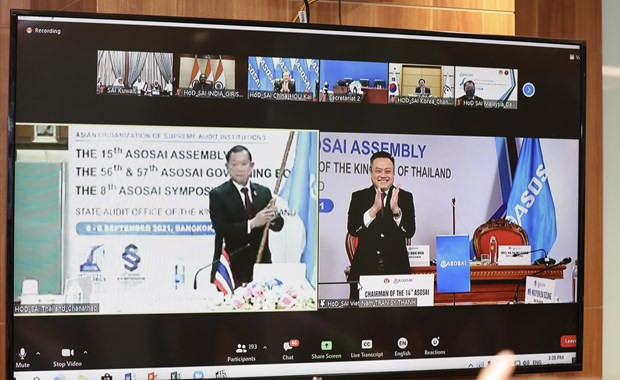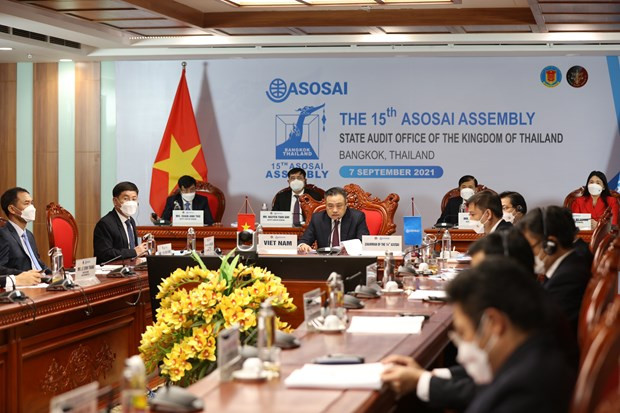 President of the State Audit Commission of Thailand Chanathap Indamra, Chair of ASOSAI for 2021 - 2024, delivers a speech at the meeting (Photo: VietnamPlus)
President of the State Audit Commission of Thailand Chanathap Indamra, Chair of ASOSAI for 2021 - 2024, delivers a speech at the meeting (Photo: VietnamPlus)Hanoi (VNA) – At the 15th Assembly of the Asian Organisation of Supreme Audit Institutions (ASOSAI), 47 supreme audit institutions (SAIs) adopted the Bangkok Declaration themed “SAIs and Preparing for the Next Normal”.
President of the State Audit Commission of Thailand Chanathap Indamra, Chair of ASOSAI for 2021 - 2024, said the COVID-19 pandemic has reshaped the future of public sector auditing, leading to new reforms amid challenges of the next normal. Though the pandemic is a challenging obstacle to the auditing of the public sector, it has also created development opportunities in the new normal period, especially the optimisation of remote auditing technologies.
He stressed the pandemic has caused global model changes, elaborating that it has changed at least three issues: peoples’ expectations of governments, governments’ role in the pandemic, and governments’ reform of public health systems after the pandemic.
As COVID-19 broke out and ravaged around the globe, some SAIs in the region has taken swift actions to respond. In fact, public audit agencies play the role of protecting, can also point out shortcomings in healthcare systems, and raise constructive opinions.
Besides, some SAIs have acted as supervisory agencies to detect frauds and corruption in emergency aid and procurement programmes amid the pandemic, according to the Thai official.
The ASOSAI Chair held that an effective and efficient SAI is now of utmost importance more than ever. Therefore, SAIs as an important part of governments could not stand outside since numerous funds are being spent quickly on coping with the pandemic.
In the time ahead, SAIs need to deliver a consistent plan to build a resilient country capable of continually weathering COVID-19 related risks, ensuring socio-economic development, and achieving the Sustainable Development Goals, according to Indamra.
The State Audit Commission of Thailand also recommended SAIs maintain and succeed in the following period of the next normal. In particular, they will still work to respond to COVID-19 with the top priority given to people’s health and safety, and remote work considered as a tool for adapting to different circumstances.
Apart from a health crisis, the pandemic could lead to an economic one. Given this, SAIs should gear up themselves for both.
As the pandemic has reshaped the audit context, SAIs should think beyond old scopes by adopting flexibility, swiftness, and resilience so as to guarantee the continuity of SAIs’ roles and essential functions in all crises, with their staff’s safety taken into account, Indamra added.
 Auditor General of the State Audit Office of Vietnam Tran Sy Thanh (R) hands over the ASOSAI Chairmanship for the 2021 - 2024 tenure to President of the State Audit Commission of Thailand Chanathap Indamra (Photo: VietnamPlus)
Auditor General of the State Audit Office of Vietnam Tran Sy Thanh (R) hands over the ASOSAI Chairmanship for the 2021 - 2024 tenure to President of the State Audit Commission of Thailand Chanathap Indamra (Photo: VietnamPlus)He said the drafting of the Bangkok Declaration was participated in by 13 member SAIs, and their opinions were reflected in the 12 articles of the declaration. The statement focuses on affirming the importance of international declarations in promoting good governance in the next normal, preparing for digital transformation in the next normal, providing tools necessary for remote work, and encouraging auditing cooperation in managing natural disasters and preparing themselves against pandemics./.
| The Bangkok Declaration 2021 is based on documentary reviews from five indispensable international declarations: Lima Declaration 1977, Beijing Declaration 2013, Hanoi Declaration 2018, Abu Dhabi Declaration 2019, and Moscow Declaration 2019. These represent the robust and the core concept for the development of public sector auditing. Meanwhile, the main chapters of the Bangkok Declaration 2021 follow the broad contours of the ASOSAI strategic plan 2022-2027, creating the whole picture of ASOSAI in the future. The Bangkok Declaration 2021 consists of four chapters: SAIs and promoting good governance in the next normal, SAIs and encouraging for the achievement of SDGs, SAIs and leveraging by using advanced technologies for public sector auditing, and SAIs and responding to disaster and pandemic issues. |





























